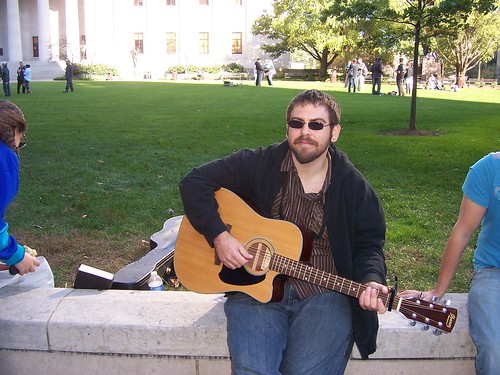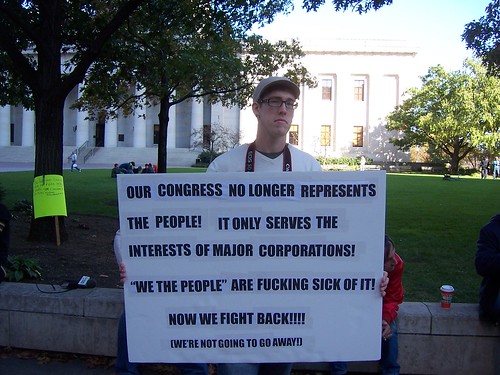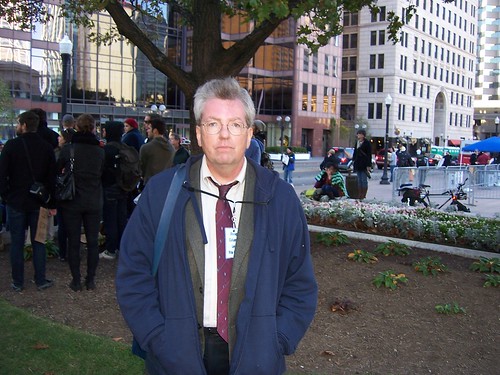
More music at our gatherings would help move the movement, as would bigger signs enable more people in passing autos to be able to read what we have to say. But on this blustery vivid fall afternoon, we at least had Steve Schoonover come down here from Michigan and sing something by Coner Oberst of Bright Eyes.
Schoonover said people are waking up, realizing the power of moral ideas.
“We need to have some moral respect for people in a way we haven’t in a long time.”
Schoonover said building a movement requires clarity about tactics, strategy, and specific goals, as well as set of values and attitudes on which to base that sort of planning.
“We’re united around a certain kind of a principle: moral values have a role to play in society. Now, how we are going to actually realize that---whether it’s putting back in place Glass-Steagall or whether it’s specific redistribution measures-- that’s going to take democratic discussion among people who are actually committed to the principle.”
Schoonover repeated a theme commonly heard at some occupy events by saying people should be put above profits and that inequality is a moral problem to be solved with a sense of urgency.
As we talked, horns of autos honked in support. Schoonover agreed some people honk but don’t join in the demonstration because they may be busy with other important things.
“At the same time, it’s more important than ever to get yourself to disrupt your daily activity, to commit yourself to something to show your solidarity if you do in fact embrace these principles.”

Christopher Costen said big money in politics is our nation’s biggest problem.
“With a bought Congress, we can’t get the things that we need. When tax breaks are going to the wealthiest people in this country, that doesn’t leave much to the social programs we need so badly for the rest of us.”
Coston said the best thing he can do about this problem is to raise awareness.
“Every person I come in contact with, every time a conversation comes up, I talk to people about this. I use my voice. I use social media anyway I can to spread messages--thru graphic design, thru photography, thru community organization. Those are things we need to do to raise awareness and spread a message to get people informed and pissed--rightly so--and into the streets to demand change.”

Bob Hart, a member of the legal team for Occupy Columbus, advised a gathering of about 40-50 people about many details pertaining to getting arrested and facing various levels of misdemeanor charges. This was in preparation for leaving the sidewalk in front of the statehouse and gathering a couple of blocks south in Columbus Commons which, despite its name, is privately owned.
As with other people’s movement assemblies or general assemblies that ‘occupiers’ in cities all over the US have been holding as an organizational tool, the gathering repeated in unison every sentence Hart said.
In addition to advising participants in Occupy Columbus, Hart said his role is to mediate and act as a liaison with police and other “agents of the state” as he referred to it. He said he wants to help keep this movement nonviolent.
Occupy activists on Wall Street and other cities have carried out actions aimed at confronting the powerful and engaging with the general public. As the movement continues, activists who have spoken with the Columbus Free Press see civil disobedience coming into play sooner or later. But using it successfully involves planning, said Hart.
“The primary thing to understand, from a group perspective, is whether it’s your strategy to get arrested. It takes people off the street. It takes money out of your organization. It splits your forces. So people need to understand what the penalty is and what may happen in terms of fines. The organization needs to consider that it may lead to some kind of injunction against them from being at certain places at certain times.”
So, there are pros and cons to getting arrested to further our causes.
“For a first degree misdemeanor in Columbus, Ohio, you can be fined up to a thousand dollars.” Hart said related expenses, such as bail, missing work to show up in court, and attorney’s fees can add up quickly.





